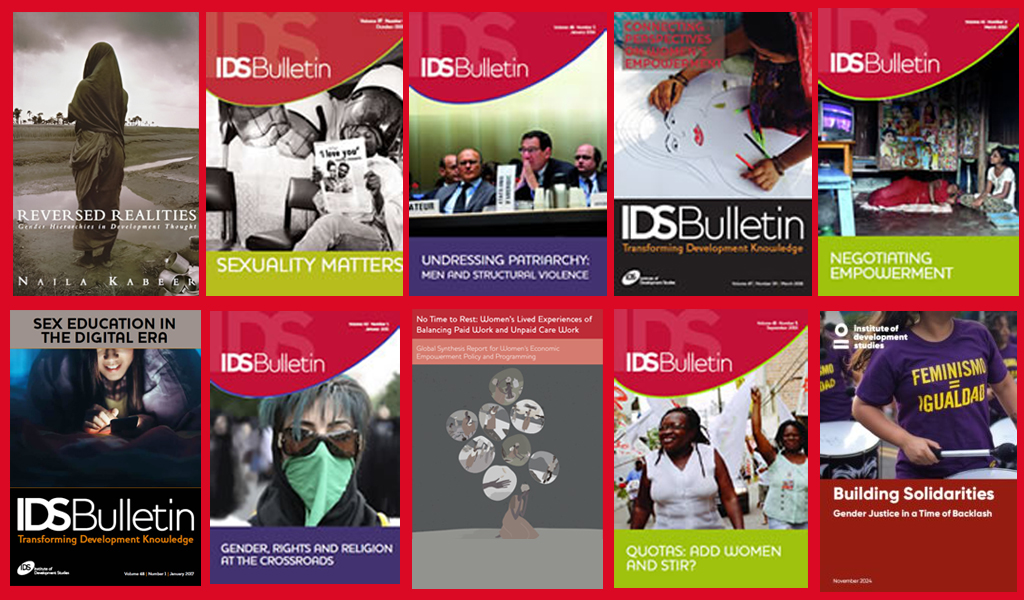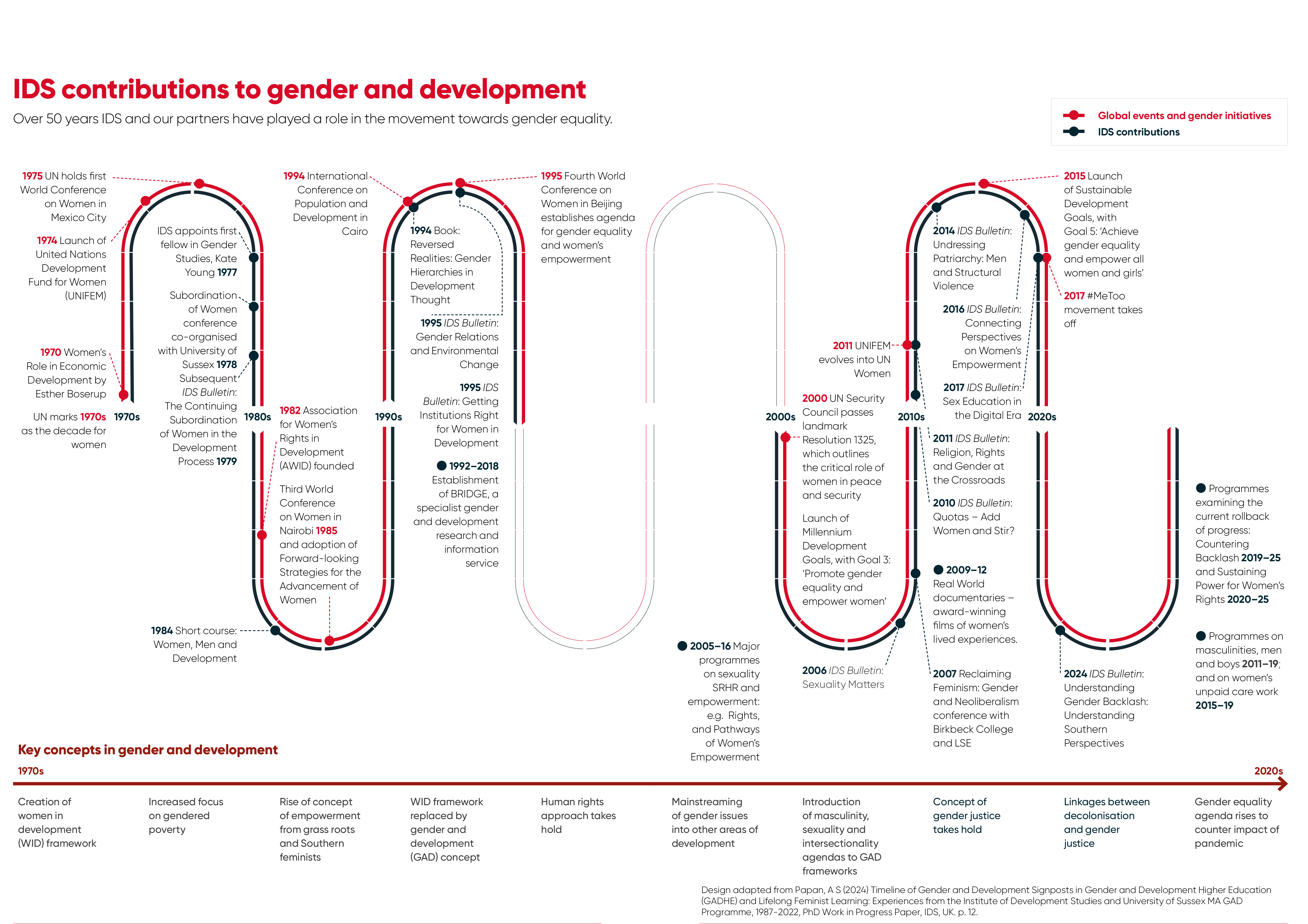The Institute of Development Studies has a long history of challenging traditional narratives. It has also led research initiatives aimed at addressing the systems of exclusion, violence, and oppression experienced by women and other gender minorities on a global scale. Through short courses, the MA Gender and Development postgraduate programme, thematic IDS bulletins, and research programmes, IDS has explored the intersections of gender with sexuality, patriarchy, religion, politics, and environmental change.

In line with this year’s 16 Days of Activism against gender-based violence, this article highlights 16 key ways IDS has contributed to the gender and development sector, as detailed in our recently launched report, Building Solidarities—Gender Justice in a Time of Backlash. These contributions reflect over 50 years of IDS’s work in advancing gender justice globally.
To view a high resolution of the timeline above click here
1. 1984: Women, Men and Development Short Course
While IDS plays a critical role in researching cutting-edge issues and concerns over gender inequality it also uses feminist pedagogy as a crucial tool to counter gender backlash. This short course was launched to explore the power dynamics of gender in international development and to allow a new generation of scholars to think critically about this inequality.
2. 1994: Book: Reversed Realities: Gender Hierarchies in Development Thought
This collection outlined the emergence of ‘women’ as an analytical category in development thought by criticising conventional development concepts. Written by Naila Kabeer, it also highlighted the gradual shift towards gender and gender relations within the landscape of development.
Read more: Building solidarities for gender justice
3. 1995: IDS Bulletin: Gender Relations and Environmental Change
This Bulletin was crucial to the history of gender and intersectionality as women’s relationship to the environment was recognised and established. It incorporated discussions on how women were the ‘major victims’ of environment degradation and how international development discourse must address these gendered impacts.
4. 1995: IDS Bulletin: Getting Institutions Right for Women in Development
This Bulletin problematised institutionalisation of gender-sensitive development policy. It did so by bringing forth new gendered perspectives on the importance of women’s political mobilisation and how that could lead to organisations being held accountable when it comes to women’s issues.
5. 1992- 2018: BRIDGE: A Gender and Development Research ServiceEstablished by IDS, BRIDGE brought together cutting-edge research and policy briefs on the importance of gendered perspectives in social movements and made the outputs available to policy makers, practitioners and movement leaders.
From 2006- 2016, programmes on Sexuality, Sexual and Reproductive Health Rights and Empowerment Initiatives like Pathways of Women’s Empowerment, focused on the intersections of sexual and reproductive health rights, sexuality and women’s empowerment, contributing to a more inclusive feminist discourse.
6. 2006: IDS Bulletin: Sexuality Matters
This issue was ground breaking as it pushed the boundaries of how the development sector addressed sexuality and advocated for sexual rights. At the time, development policymakers and practitioners often viewed sexuality through a narrow lens, primarily in the context of AIDS. The IDS Bulletin responded to this gap, drawing inspiration from the 2005 ‘Realising Sexual Rights’ workshop at IDS, which led to new approaches for implementing sexual rights.
7. 2009 – 2012: Real World Documentaries: Women’s Lived Experiences
This publication addressed the importance of documentary as a research communication tool. It argued that researchers and filmmakers could gain much from co-creating visual narratives that represent gender, sexuality, and womanhood with complexity and emotion.
8. 2010: IDS Bulletin: Add Women and Stir?
Issued during a period when quotas were gaining popularity to secure ‘female’ political representation as a fast-track solution to increase the number of women in parliaments, it offered case studies from various countries that implemented the quota system and examined women’s decision-making power.
9. 2010: IDS Bulletin: Negotiating Empowerment
This IDS Bulletin emphasised the complexities of women’s empowerment as a dynamic process requiring systemic change. It critiqued simplistic development approaches and highlighted the importance of collective action, structural reform, and amplifying women’s voices. It argued that policies needed to address power inequalities to enable genuine, transformative change.
10. 2011: IDS Bulletin: Religion, Rights and Gender at the Crossroads
This Bulletin pushed for a more intersectional approach to gender and religion, particularly in global, local, and national politics. It brought together scholars, activists, and practitioners to share their analyses of secularism versus religion and addressed themes of religion, politics, and women’s rights.
11. 2014: IDS Bulletin: Undressing Patriarchy: Men and Structural Violence
Following the international symposium ‘Undressing Patriarchy’ in September 2013, this issue expanded debates on men and masculinity through a deeper and more radical analysis of patriarchy. It focused on ‘undressing patriarchy’ to uncover the drivers of gender inequality rather than portraying all men as patriarchs.
12. 2016: IDS Bulletin: Connecting Perspectives on Women’s Empowerment
This Bulletin challenged the notion of women’s empowerment by arguing that, while widely accepted, it is a complex concept that resists simplistic measurement. It called for a deeper analysis of the components of women’s empowerment—economic, social, and political. Additionally, it served as a reminder that empowerment can only be realised through collective action, rather than through individualised notions of empowerment that fail to address structural inequalities and inequitable power relations.
13. 2017: IDS Report: No Time to Rest: Women’s Lived Experiences of Balancing Paid Work and Unpaid Care Work
One of the most significant themes in gender studies is the imbalance between paid and unpaid labour. This report by Deepta Chopra provides substantial evidence of the lived experiences of women from low-income families and how they balanced paid work with unpaid responsibilities in India, Nepal, Rwanda, and Tanzania between 2015 and 2017.
14. 2017: IDS Bulletin: Sex Education in the Digital Era
This bulletin was one of the first collections of scholarly work aimed at a diverse audience of researchers, policymakers, and practitioners in sexual and reproductive health, as well as youth and digital development. It emphasised the need for academics to develop digital literacy skills to counter the moralistic and alarmist messages young people often receive about sex and sex education. Such messages can endanger rather than empower, and the bulletin advocated for a shift towards more supportive and informed approaches.
15. 2024: Journal Article: Patriarchal (Dis)orders: Backlash as Crises Management
With funding for gender backlash movements three times greater than for counter-backlash initiatives, this article provides crucial research. It highlights how patriarchy is deeply connected to the maintenance of a multidimensional hierarchical status quo. Combining themes of crises, nationality, and gender, it reveals that the body, family, and nation are key areas where countering backlash can lead to transformative shifts within hierarchical structures.
16. As the funding for gender backlash continues globally, IDS has been at the forefront of programmes that counter these movements through programmes like Countering Backlash and Sustaining Power for Women’s Rights. These initiatives push back against the growing opposition to gender equality along with exploring pathways to sustaining women’s rights in hostile environments.

